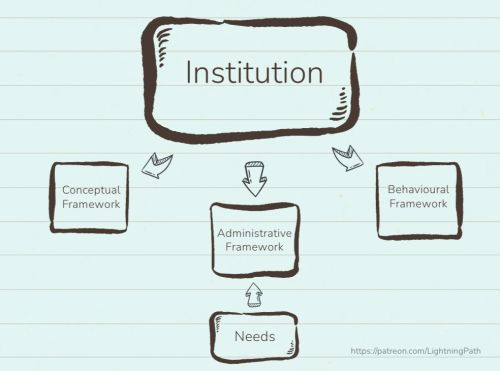Institution: Difference between revisions
An Avatar.Global Resource
No edit summary |
No edit summary |
||
| (3 intermediate revisions by the same user not shown) | |||
| Line 2: | Line 2: | ||
<h1 class="customtitle">{{FULLPAGENAME}}</h1> | <h1 class="customtitle">{{FULLPAGENAME}}</h1> | ||
<blockquote class="definition"> | <blockquote class="definition"> | ||
An '''Institution''' is an organized system of conception, administration, and behaviour that structures thinking and behaviour with a view towards meeting various individual and societal needs. | An '''Institution''' is an organized system of conception, administration, and behaviour that structures thinking and behaviour with a view towards meeting various individual and societal needs. Institutions are created by and operate within a specific[[Institutional Framework]]. </blockquote> | ||
==Types== | ==Types== | ||
[[Institution]] > {{#ask:[[Is an::Institutional Type]]}} | [[Institution]] > {{#ask:[[Is an::Institutional Type]]}} | ||
==Related LP Terms== | ==Related LP Terms== | ||
| Line 22: | Line 16: | ||
[[Institution]] > {{#ask:[[Is a related term::Institution]]}} | [[Institution]] > {{#ask:[[Is a related term::Institution]]}} | ||
==Notes== | |||
Institutions are foundational structures within society that serve to organize and facilitate various aspects of human activity, addressing both individual and societal needs. They can be effectively analyzed through three primary frameworks: the conceptual, administrative, and behavioural frameworks. This analytical approach provides a comprehensive understanding of how institutions function, their underlying principles, and their impact on society. | |||
<center>[[image:institution.jpg|500px]]</center> | |||
Institutions may be categorized as an [[Authentic Institution]]or an [[Inauthentic Institution]] | |||
Although we are often born into institutions, institutions themselves do not exist without tacit individual approval and acceptance of behavioural patterns. Teachers, for example, recreate the institution of education on a daily basis by their formal and informal participation in the behavioural patterns associated with the institution. It is the same with all institutions. An institution exists only when individuals voluntarily (or involuntarily) participate in the behavioural patterns. In other words, the behavioural patterns of institutions do not exist independently of the institution. We (and by "we" I mean the witting or unwitting participants in institutional behaviours) are taught the "ways" and behaviours of a specific institution. Teachers for example spend many extra years in school not only learning the technical component of teaching, but also the expected behaviours. The same can be said of any institution in society. The behaviours, norms, and values associated with particular institutions are "passed on." This process of learning the institutional ropes is known as [[Socialization]]. | |||
For more on institutions, see [[Institutional Framework]] | |||
{{curriculum}} | |||
{{patreon}} | |||
{{allaboutinstitutions}} | |||
{{endstuff}} | {{endstuff}} | ||
| Line 52: | Line 41: | ||
[[Is a related LP term::Regime of Accumulation| ]] | [[Is a related LP term::Regime of Accumulation| ]] | ||
[[Is a related LP term::Human Development| ]] | [[Is a related LP term::Human Development| ]] | ||
[[Is a related LP term::Socialization| ]] | |||
Latest revision as of 14:16, 13 November 2024
Institution
An Institution is an organized system of conception, administration, and behaviour that structures thinking and behaviour with a view towards meeting various individual and societal needs. Institutions are created by and operate within a specificInstitutional Framework.
Types
Institution > Administrative Framework, Authentic Institution, Inauthentic Institution
Related LP Terms
Non-LP Related Terms
Institution > Human Development, Institutional Framework
Notes
Institutions are foundational structures within society that serve to organize and facilitate various aspects of human activity, addressing both individual and societal needs. They can be effectively analyzed through three primary frameworks: the conceptual, administrative, and behavioural frameworks. This analytical approach provides a comprehensive understanding of how institutions function, their underlying principles, and their impact on society.

Institutions may be categorized as an Authentic Institutionor an Inauthentic Institution
Although we are often born into institutions, institutions themselves do not exist without tacit individual approval and acceptance of behavioural patterns. Teachers, for example, recreate the institution of education on a daily basis by their formal and informal participation in the behavioural patterns associated with the institution. It is the same with all institutions. An institution exists only when individuals voluntarily (or involuntarily) participate in the behavioural patterns. In other words, the behavioural patterns of institutions do not exist independently of the institution. We (and by "we" I mean the witting or unwitting participants in institutional behaviours) are taught the "ways" and behaviours of a specific institution. Teachers for example spend many extra years in school not only learning the technical component of teaching, but also the expected behaviours. The same can be said of any institution in society. The behaviours, norms, and values associated with particular institutions are "passed on." This process of learning the institutional ropes is known as Socialization.
For more on institutions, see Institutional Framework
Curriculum/Courseware
Patreon Units
Citation and Legal
The SpiritWiki is a freely available, open-access Knowledge System devoted to health, healing, and reconnection. You may freely use information in the SpiritWiki; citation and attribution are welcomed, but not required. You can help this knowledge system grow by joining its Patreon.
The SpiritWiki is marked CC0 1.0 Universal and in the public domain, free for everyone on the planet to use. Please support its growth.
Footnotes
